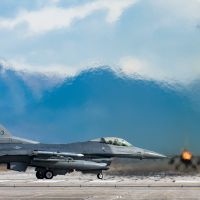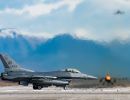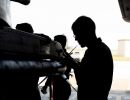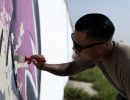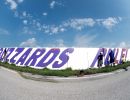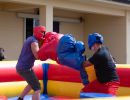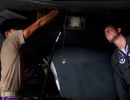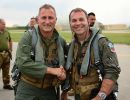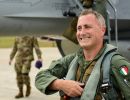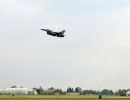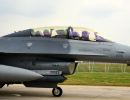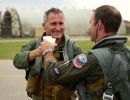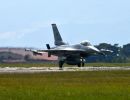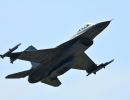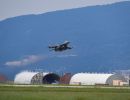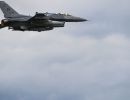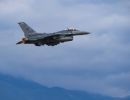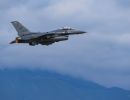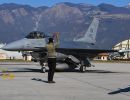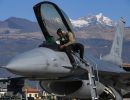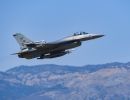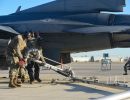After graduation, and assignment to Foster Field, we were further assigned to Matagorda Peninsula, a satellite base under Foster Field. We towed targets in AT-6s and later in B-34s at the Air Corps Fighter Gunnery School.
In February 1944 we were transferred to Richmond, Virginia and went through transition training in the P-47 Thunderbolt. This was the airplane that we were both to fly in combat. From Richmond we went to Norfolk, Virginia for fighter gunnery training, then to Shrewsbury, England for overseas training. From Shrewsbury we went to a replacement depot in Paris, and finally were assigned to the 510th Fighter Squadron, which was based in St. Dizier, France. We stayed together through this series of transfers by seeking out the respective personnel officers making each assignment and convincing them we should stay together. At the replacement depot in Paris we volunteered to go to the 510th Fighter Squadron together.
The 510th Fighter Squadron was an agressive unit that compiled an impressive war record. It was, and is, known as Jenkins Jerry Junkers.
Hugh liked to be called Hap. He wanted to be a professional baseball player and being from Shell Lake, Wisconsin, closely followed Big Ten sports, especially baseball and football. Hap liked to talk and when he found I was a fair listener he sought my friendship. He liked to talk about his boyhood experiences, his family, and most of all, the subject that consumed us all in those days, his daily flying experiences.
We were compatible and I have agonized over Hap's death in combat for fifty years, but I want to make it clear that like all close relationships this one had its periods, moments is probably a more fitting word, of strife. There were several times when we argued heatedly and went our separate ways for a few days or longer. However, when we wanted someone to go to town with, or someone to confidentially talk to, we went back together with no apology and with the unstated understanding that we were just caught in a transient emotion when we argued, and that no apology was necessary.
When we were on Matagorda Peninsula we had baseball games as part of our athletic program and Hap was always prominent in those games. He was good, but not good enough to play professional baseball. He was a hopeless showboat on the baseball diamond. That was not characteristic of his personality, incidentally, since he was reasonably reserved except in that special setting.
Watching him play sandlot ball it was evident that that he was just good enough to excel at that level. His desire to be a professional baseball player was just a poignant dream, however, that dream was consistent with his optimism. If he had lived to face the disappointment of not being able to make it in baseball, he would have reconciled that failure and cheerfully gone on to other ventures.
So since it was evident that his personality and philosophy justified his nickname, I cherished his friendship, even if he was impossible on a baseball diamond.
What kind of picture do you get from these words? A healthy, athletic young man with a cheerful attitude and a resiliency that served him well. Hap had obviously been loved by his family and in all settings, in school or in the military, was popular with his associates.
Hap was a good pilot. The year of seasoning on Matagorda Peninsula as a tow target pilot after graduation from flying school and before going into combat produced a polished aviator. His normal approach to flying was cautious and sensible but when necessary he could fly an airplane to the extreme edge of its performance envelope and hold it there.
At this point you must know one more thing about Hap Miller to have a full understanding of what he did for us, and for his country. Hap's mother was a widow and Hap provided for her support and for the support of his brothers and sister. There is a military directive that excuses men in this circumstance from combat. Hap knew this and he chose to go into combat rather then exercise his right to be excused.
Hap flew his first mission before I did. We communicated almost as one person so, after the mission debriefing, I sought him out to get his views on what it was really like out there. I no longer remember where we were when we had that first private moment together but I remember, in the core of my soul, that he talked in a way that was very different. He admitted that he had been very frightened on that first mission, and that he had truly faced his own mortality for the first time in his life. He was now sure, he said, that he had make a mistake when he chose to go into combat rather than be excused. I could not think of anything appropriate to say, so I just absorbed and remembered his words.
Although I did not think of an appropriate response at that time it is now evident to me that since November 1944 I have known a true American hero. Hap was in combat because he chose to there, and he experienced very real and very profound fear on his first combat mission, but went back, and then went back again.
On his third mission the right wing of his P-47 was blown off by flak on a strafing pass. Since he was in a high speed pass at at very low altitude when he lost his wing he had no time to agonize over his fate. Perhaps in those few seconds he completely understood what he had lived for.
After Hap was killed I wrote to his mother and told her that Hap was a good pilot, popular with his fellow pilots, and my very special friend. All of the things I knew she would like to read, because I hoped to assuage her pain-and because they were true. I considered telling her that Hap could have been excused from combat, but I feared that her grief would be boundless if she knew that he could have lived, if he had chosen to. But I also reasoned that since she knew him better than anyone else, she would not be surprised by his courage and his patriotism. On balance, I chose not to tell her.
Ernie Pyle was the most famous of all the corespondents that traveled with the army and wrote stories based on his experiences with the front line troops during WW11. He wrote one story about a young Army captain that was killed in action in Italy. This young officers' body was brought out of the hills where the fighting was centered and laid on the ground in an area to the rear of the battle lines. One of the men in his company walked over to where the body lay, and stood looking at it for several heartbeats. Then just before he walked away he shook his head slowly and softly said, "Goddamn."
Hap's brother, Ray Miller, graduated from college and became a school teacher in King City, California. After I learned about him and where he was, I made a date to have lunch with him and his wife in King City. We discussed Hap's loss and the effect that it had on him and his family. Ray stated that he felt that the loss of her lodest son caused her to grieve so much and so long that it shortened her life. Then Ray said something that I can only write about, because I cannot repeat it without crying. He said that he was only nine years old when Hap was killed and does not remember too much about him. He does vividly remember, however, when Hap came home on leave before going oveseas and he remembers going to town with him and how proud he was to be seen with him.
Since I knew Lieutenant Hugh R. Miller well and have refined my thoughts about him for over fifty years, I can confidently state that he would choose for us to remember him as: Hap Miller, Fighter Pilot.


